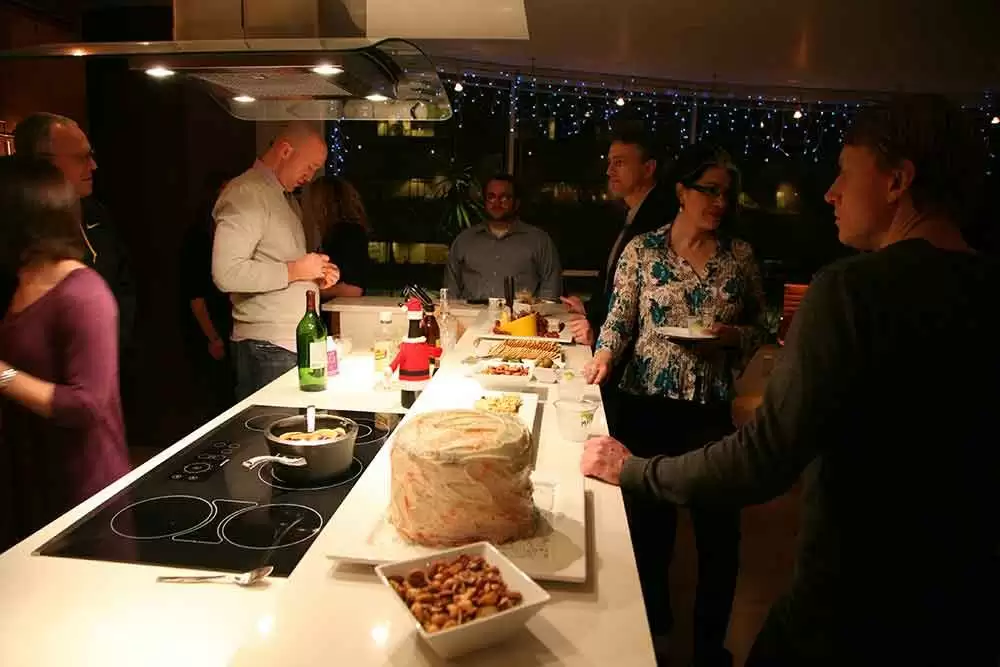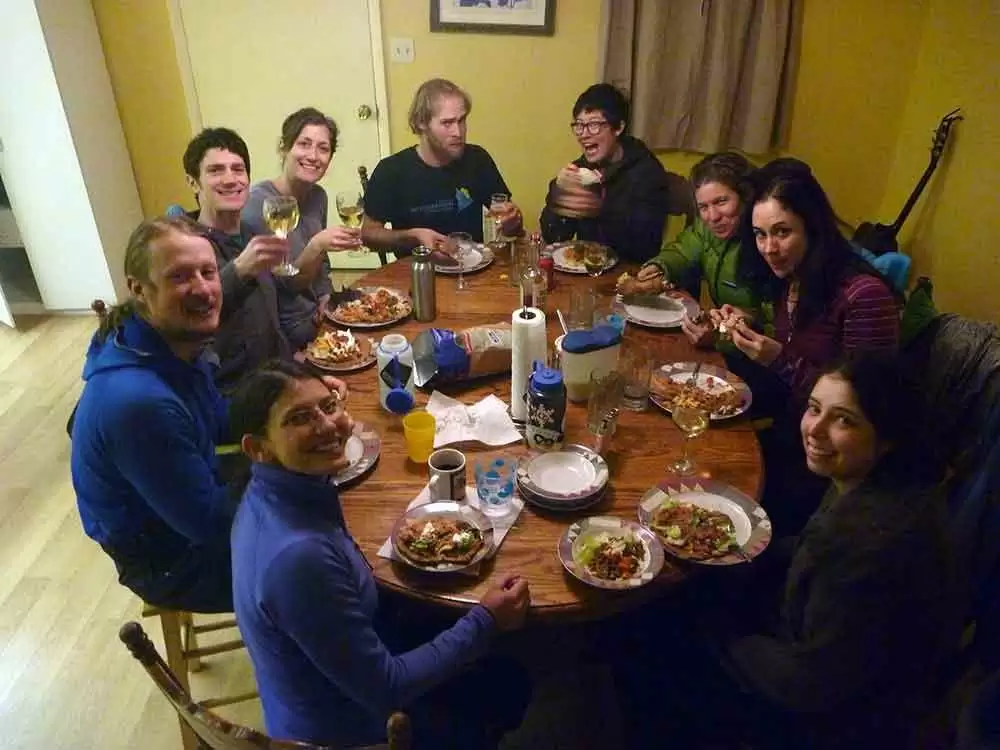
My husband gave me an “adventure island hopping tour” to Greece for a graduation present that included two dedicated guides, all meals, and one or two adventures a day with a group of thirteen other people we had not previously met. To prepare, we increased our workouts and added regular six mile walks. We were very excited to see Greece in this way! The tour company sent me a form to fill out asking me to disclose food allergies. Prior to filling it out, I investigated the foods in Greece to see what they ate, how foods were prepared and to get an idea of what I thought might be safe for me to consume. I also watched videos on how foods are prepared and saw that a frequent practice is to grill meats and then grill bread on the same grill (without cleaning in between). That was worrisome. Rather than bogging them with a list of what I cannot eat, I said that I was allergic to dairy and gluten and the best foods for me to eat were steamed poultry or fish, steamed vegetables, and fruit such as oranges or bananas. Steaming seemed to be the safest suggested cooking method.
The Social Aspects of Food Sensitivities survey I conducted revealed that travel is by far one of the most challenging activities for those with celiac disease or food sensitivities. In my extensive interviews, I learned that Greece was on the top of the list of countries that people reported was the most challenging, so I was a little concerned about going. I resolved that I wouldn’t let celiac disease debilitate me, and force me stay at home. I want to experience life! So, whenever I travel, (heck, even when I leave my home to go anywhere) I always carry a 3 oz. pouch of tuna and a ½ cup sealed package of walnuts (purchased in the baking aisle at the grocery store) and a fork. (Note, these foods get through TSA in my carry-on every time!) It is amazing how many times that little meal has saved the day, and quells my “food insecurities.” I feel confident knowing I always have food with me. So even though I anticipated finding safe foods in Greece, I packed snacks such as Lara bars, RX bars, pre-packaged walnuts and almonds, pouches of tuna, dehydrated vegetables, and turkey jerky, (easy to reconstitute into soup) just in case. I even packed some of my favorite chocolate.
Celiac.com Sponsor (A12):
At that first welcome meal that was abundant with lovely Greek foods served family style, I realized that nothing on the table was safe because nearly every dish contained gluten, and foods such as salads were likely prepared on surfaces also used to slice bread. Further, foods that didn’t contain gluten, contained dairy. Feta cheese, Parmesan, and yogurt were abundant at every meal. A plate of chicken was presented near my plate, apparently for me, but it had cheese on it. I passed it down to the others at the table. So, even though I filled out that travel form disclosing my allergies, there was nothing for me to eat at that meal.
I have a great appreciation for the “art” of cooking, for flavor-pairing, for attaining the right mouth feel, and balance of flavors. The Greeks do too. In fact, the word epicurean (pleasure of food and drink) originated in Greek in the 15th century. Typical evening meals start at 9:00 PM and end around 2:00 AM, served with weak wine so people can eat, drink, and chat throughout the evening. Meals are a social event enjoyed regularly by immediate and extended family, and friends. At our meals, every dish was paired with lovely sauces or accompaniments to enhance the flavors and texture. Our guide carefully explained how to eat each dish, whether to stir in the cheese, or sauce or to eat it on the side, what to dip where, and what to pair with what. Wines were selected based on the entrée. The culinary skills demonstrated in the dishes were superior. Food in Greece is revered and celebrated. While my companions were exuberantly eating, I remembered a time in my past before diagnosis when I went through a “Greek Food” phase and reminisced on the lovely taste combinations of Greek foods. As a guest in their country, the last thing I wanted to do was to suggest alterations in the way they prepared these beautifully balanced meals to accommodate my dietary requirements. I didn’t want to insult their “art.” I also didn’t want to come off as a demanding person requiring them to change century-old practices for my seemingly unusual needs. Finally, I didn’t want to make a spectacle of myself in the group I’d be spending the next ten days with. I didn’t want to be “that needy person.” I sat there while these strangers raved about the flavors and I tried to sneak-eat the pre-packaged walnuts from my purse, but I couldn’t discretely get the darn bag to open.
Lunch the next day featured a similar array. (This time I pre-opened my walnuts and brought a banana.) Tour participants noticed and passed various dishes to me. I said that I have food allergies and wanted to stay “safe.” The tour guides also noticed and asked me what I could eat, saying they would order anything I wanted. I said I was fine, that I wasn’t feeling that great and that the banana and walnuts were adequate. I really didn’t feel like exerting my needs, and risk insulting anyone. Later on, after lunch the two guides met with me privately and said, “You paid for food on this trip and we want to accommodate your needs. Please tell us how to do that.” I told them I’d think about it and get back with them. I felt overwhelmed with desperation and a little depressed. I was catching a cold from a direct-hit sneeze at the Parthenon, had a low-grade fever and felt pretty bummed that I may be eating the foods I packed three times a day. That food in my backpack was intended for emergencies, not for every meal. My resolution to lead a normal life was evaporating too. I was beginning to wonder if going on this trip was a big mistake, and thinking maybe it would be better if I had stayed home. Feelings of “food insecurity” set in, despite my suitcase of food. It was definitely the low-point of the trip, likely magnified by the fever.
To trust people you do not know whose language you do not speak, who have never heard of celiac disease, (and once they have, think it is shocking that anyone can be that sensitive) for every meal for ten days daunted me. And because we’d be travelling to different places every day, I’d have to trust different cooks to judge my needs as credible. The thought of this, especially when witnessing how much gluten was present in every dish caused me to have a great deal of anxiety about becoming cross-contaminated, no matter what I ordered. I’ve worked in big kitchens with multiple cooks, and know that getting meals on the table requires “rote cooking” skills, often done in a frenzy during peak times. Disrupting that “assembly line rhythm” when trying to serve a lot of people at the same time causes problems. Old habits kick in, and cooks forget about the special requirements in their haste. Food is “glutened” without a thought because that is the way it is always prepared. It is not a reflection on the cook – they are doing what they do with tried and true methods with the goal of getting hot, tasty food on the table. Knowing this, I’d rather go hungry because cross-contamination in one meal with just a spec of gluten would ruin my trip, and make me miserable for weeks. I was in a dilemma.
For years after being diagnosed, my husband and I didn’t attempt group-trips that required others to prepare my meals. Rather, we’d stick to American cities and finally branched out to Europe once or twice, finding grocery stores to purchase suitable foods. It led to picnics in scenic places. Occasionally in restaurants, I would present my “dietary restrictions card” in the language of the country, and to my relief, usually received safe meals. But something about Greece was different. In most countries in Europe, gluten intolerance is known. Here, it seemed very obscure. In fact, I learned that the Celiac Society has only had a presence in Greece for one year. Celiac disease is virtually “unknown” at the moment.
I thought about the “raw ingredients” presented at the two meals we’d had so far, and determined that zucchini, green beans, potatoes, carrots, chicken, or fish were regular fare. Thinking most restaurants would have those foods I met with the two guides and gave them the card I brought with me explaining my dietary issues and what an ideal meal would be. Though their English was exceptional, I gave them the card in both English and Greek (translated on Babblefish, and made them laugh!). They asked me what I would ideally like, and I said, “Let’s keep it simple. I’m happy to eat the same foods for lunch and dinner … so a steamed piece of fish or chicken with some zucchini, potato, and a carrot would be fine.” They said, “None of the restaurants have steamers. How about if we ask them to use a clean pan that has been washed free of grains and boil your meals?” I said, “That is a great idea! I would feel comfortable with that.” Over the course of the week, they called each restaurant in advance of our arrival and I was presented with lovely plates of these foods.
The guides had to explain to each of the restaurants “safe practices” a new concept for most of them (though one cook had a sister with celiac disease and understood completely). Many of the cooks wanted to add things to make it taste better, and the guide explained, “No, this is all she can have.” Sometimes, the restaurants didn’t have the foods I requested and the guide went to a grocery store and brought it to the chef. (He was very discrete about this and no one on our tour knew he did it, and I am still touched by his kindness.) One time, the guide actually cooked my meal for me! Several of the chefs objected to boiling fish, and others, since they were given a few days notice, sourced a type that could be boiled. I would have suggested grilling it on a “clean” grill using olive oil, but in the interest of keeping it as simple as possible, I stuck with “boiled.” Simplicity seemed the best tact rather than trying to convey the nuances of safe practices to people who have never heard of such a thing. And since it was so different from how the chefs typically cooked, I felt safe that old habits wouldn’t kick in to cross-contaminate the foods.
The others on the trip were very cooperative, no longer strangers, but fun travel companions who kept bread crumbs from flying on my plate when we were eating a picnic on a windy day, and who were careful to keep the bread basket away from my plate while sitting at the table. I sat on the end of the table to dodge crumbs, and to have access to the waiter if I needed to – though I didn’t – the guides did all of the interfacing for me. When everyone else stopped for a gelato, the guide handed me a banana or an orange. My gratitude for the meals they prepared for me influenced the way the others viewed my meals – with appreciation that the guides and restaurants were so accommodating and cooperative.
I learned a few lessons too. For someone as outspoken about celiac disease, sometimes my own timidity surprises me, but as I said, I really didn’t want to be a bother, or to make the entire trip focused on my food requirements. An extensive study conducted by Peniamina, Bremmer, Conner, and Mirosa (2014) found “the main qualities seen as important for coping with allergen-free eating were assertiveness and organizational skills” (p. 943). Assertiveness, they continue is paramount to ensure the person with allergies conveys his or her needs to avoid risk-taking behaviors. I admit that I did not initially assert myself, and it was only because of the guide’s insistence that I was given suitable meals. However, eating is a fact of life, and it comes up at least three times a day, so it is something that has to be dealt with. Assertiveness means being confident enough with yourself to ask for your special needs to be met, or to bring foods for yourself and eat them openly. It doesn’t mean being demanding, or rude. It just means simply stating the facts and asking for cooperation. Assertiveness would have meant that I initiated that private conversation with the guides, rather than the other way around. Both guides said I was too polite, and that they wanted to help me. They said if I had been demanding, they still would have helped me, but reluctantly. I really didn’t want to be a problem, but in the end, I did have to eat. It does feel like walking a tightrope, to find that happy medium to be assertive, firm, friendly and respectful, all at the same time. It is a social skill worth practicing. I also realized that the further away from home I get, the more my “food insecurities” abound. Realizing this is important and requires mitigation strategies such as packing roughly 1,000 calories of food per day in my bag, and knowing where grocery stores are when I get someplace.
When conducting the interviews for the Social Aspects of Adults with Food Sensitivities, many study participants said they gave up trying to travel internationally, though some still do. A world traveler said that Denmark and Italy were very knowledgeable about safe practices, and that the British Isles are the mecca for travel for someone with celiac disease, specifically Ireland. Another who spent a semester in Spain said they were very aware there when cooking her meals.
Border control can be an issue. It is mandatory to research the country’s restrictions before going, though one person told me she still does travel and discovered that customs agents in some countries will throw away foods you bring, and that it is inconsistent, depending on which agent you get. It seems that manufacturer sealed foods are more likely to be approved, than foods stored in zipper locked bags. That is why I brought only factory-sealed foods, however the Greek border control did not even ask about the foods I was carrying. In fact, I threw away more food to get back into the U.S.! Other countries have posted restrictions on the Internet. For example, no meats (like my packaged turkey and tuna) of any kind and many other foods are prohibited in Japan and other Asian countries, and all food must be declared upon entry. If the food I packed had been confiscated at customs, I would have gone hungry. Even though they accommodated my needs, the meals required caloric supplementation. I was glad I had high-fat bars and nuts with me.
Several things contributed to my successful trip. I came home un-contaminated, and didn’t loose much weight! (In contrast, my fellow travelers complained about gaining weight because the food was so fantastic, and isn’t that a sign of a great trip!). I ate my bars and nuts for breakfast (but could have eaten picnic eggs and fruit provided at the breakfast buffets). I wouldn’t have come up with the idea of a “boiled meal” on my own, but it is a really good idea. The guides, who had never heard of celiac disease before did some research between day one and our meeting. They learned from reading the Internet about safe practices. I am grateful they proposed the “boiled meal” idea – and it is one that may work for you when travelling, or if you are put into a situation where meals are likely cross-contaminated. That idea, and the guides’ cooperation were the keys to my successful, pleasant trip. The guides also coached me on what would have been a better way to write my card. Here’s what it says now based on their suggestion:
I have celiac disease and am allergic to gluten (wheat, barley, rye, bread, and most grains) dairy (cheese, milk, butter, yogurt), coconut, palm, and pine. Would it be possible for me to please have fish or chicken boiled or steamed with vegetables (with no added sauces or condiments) served with potato, beet, turnip, or rice? It is essential that foods prepared for me have not come into contact with gluten-containing grains or dairy. Please boil or steam my food in a pan that has been thoroughly cleaned from any residual grain. Thank you.
Prior to going on an organized trip, I now ask these questions:
- Do you think restaurateurs would be able to accommodate my requests, specifically for lunch and dinner?
- Are there stores, stands, or markets along the way for me to purchase foods to supplement my meals?
- Would it be culturally acceptable for me to request a “special meal?”
- If restaurateurs cannot comply, would it be acceptable if I ate foods I provide myself at the table? I do not want to insult anyone with my special needs.
- Do you think I could get packaged turkey jerky and manufacturer sealed packaged tuna pouches through customs in (fill in country name)?
I consider the trip a success because I was able to enjoy the adventures and not be preoccupied with food or being cross-contaminated. I loved seeing the different islands and learning about the culture. I owe a lot of that success (really all of it) to the determination of the guides to ensure I had safe foods to eat. Though moving forward, I will be more assertive and not hope that others take that initiative for me. Further they explained that week after week, they bring large groups to these restaurants and if the restaurant couldn’t accommodate someone with life-or-death dietary needs, then they’d find one who would, and quipped, “Really, how hard is it to boil chicken and a few vegetables?” In fact, one restaurant flat out said they wouldn’t accommodate their request for me and that restaurant is now off of the tour list forever. I don’t know whether other guides on other tours would be so accommodating, but I am very grateful those two took the time to ensure I had safe foods to eat.
I found that wherever you go, there are good people who try to understand and to accommodate, especially if you make your requests simple using familiar foods. I just wish the stakes weren’t so high if some well-meaning person makes a mistake. Going on a group-trip where all of the plans are made for you, with interesting guides that teach you about the civilization, culture, religion, foods, farming methods, and a host of other insights can be more rewarding than doing it on your own. It was a very enriching trip, and I am grateful for that potato, chicken, carrot, and green bean meal. The boiled technique brought to mind how my grandmother cooked, blanketed me with peace of mind, and enabled me to focus on sharing meaningful conversations throughout the week with my fellow travellers.
Let’s discuss - Please respond to the questions below in the comments box below this article:
- Does my experience encourage you to travel? Why or why not?
- What steps do you take when traveling?
- What have you done that has ensured a successful trip?
- Please share your “travel” story, so we can all learn how to navigate this situation better. Thanks!
References:
- Peniamina, R. L., Bremer, P., Conner, T. S., & Mirosa, M. (2014). Understanding the needs of food-allergic adults. Qualitative Health Research, 24(7), 933-945. doi: 10.1177/1049732314539733










Recommended Comments
Create an account or sign in to comment
You need to be a member in order to leave a comment
Create an account
Sign up for a new account in our community. It's easy!
Register a new accountSign in
Already have an account? Sign in here.
Sign In Now